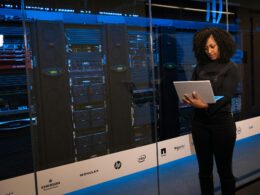In today’s digitally driven world, the importance of data security cannot be overstated. With vast amounts of sensitive information being generated, processed, and transmitted across various platforms, ensuring its confidentiality has become paramount. Traditional security measures such as encryption and firewalls have long been the norm, but with the rise of sophisticated cyber threats, a more advanced approach is needed. Enter confidential computing – a revolutionary technology poised to redefine the way we protect our most valuable data.
What is Confidential Computing?
Confidential computing is a paradigm shift in data security that aims to safeguard sensitive information even when it’s being processed. Unlike conventional methods where data is encrypted at rest and in transit, confidential computing extends protection to the very moment when data is being utilized by applications, algorithms, or services. This means that even in a shared environment, such as the cloud, data remains encrypted and inaccessible to unauthorized entities throughout its lifecycle.
How Does It Work?
At the heart of confidential computing lies a concept known as Trusted Execution Environments (TEEs). TEEs create secure enclaves within a device’s hardware or software where sensitive operations can be executed in isolation from the rest of the system. These enclaves are fortified against external tampering, ensuring that even the most determined attackers cannot access the data or compromise its integrity.
One of the key technologies driving confidential computing is Intel® Software Guard Extensions (SGX), which provides a secure execution environment for applications. By leveraging SGX, developers can partition their code and data into isolated enclaves, shielding them from potential threats. Similarly, other hardware-based solutions like AMD Secure Encrypted Virtualization (SEV) offer similar capabilities, providing a diverse ecosystem for implementing confidential computing solutions.
The Benefits of Confidential Computing
The adoption of confidential computing offers a myriad of benefits for organizations across industries:
- Enhanced Data Privacy: With confidential computing, organizations can maintain control over their sensitive data, even when outsourcing computing tasks to third-party providers. This ensures compliance with stringent data protection regulations such as GDPR and CCPA, mitigating the risk of costly data breaches and regulatory fines.
- Secure Multi-Party Computation: Confidential computing enables secure collaboration and data sharing among multiple parties without compromising confidentiality. By leveraging TEEs, organizations can perform computations on encrypted data, extracting valuable insights while preserving privacy.
- Protection Against Insider Threats: Traditional security measures often struggle to defend against insider threats, where malicious actors exploit their privileged access to compromise data. Confidential computing minimizes this risk by encrypting data at the application level, preventing unauthorized access even from privileged users.
- Future-Proof Security: As cyber threats continue to evolve, the need for adaptable security solutions becomes increasingly critical. Confidential computing provides a future-proof framework for protecting data, allowing organizations to stay ahead of emerging threats without overhauling their existing infrastructure.
Use Cases of Confidential Computing
The versatility of confidential computing opens up a plethora of use cases across various industries:
- Healthcare: Confidential computing can revolutionize healthcare by enabling secure data sharing among hospitals, research institutions, and pharmaceutical companies. Protected health information (PHI) can be analyzed in encrypted form, facilitating collaborative research without compromising patient privacy.
- Financial Services: In the finance sector, confidential computing can be leveraged to perform complex financial calculations on encrypted data, safeguarding sensitive information such as customer transactions and investment portfolios.
- Supply Chain Management: Confidential computing enhances supply chain security by encrypting critical data related to inventory management, logistics, and procurement. This ensures the integrity of supply chain operations while protecting against unauthorized access and counterfeit products.
- Edge Computing: With the proliferation of edge devices, ensuring data security at the network edge is paramount. Confidential computing empowers edge devices to process sensitive data locally within secure enclaves, reducing latency and enhancing privacy in decentralized environments.
Confidential computing represents a paradigm shift in data security, offering unprecedented levels of protection in an increasingly interconnected world. By leveraging trusted execution environments and hardware-based encryption, organizations can safeguard their most valuable assets from evolving cyber threats. As the technology continues to mature, we can expect to see widespread adoption across industries, driving innovation and empowering organizations to embrace the full potential of secure data processing. In the digital age, where data is king, confidential computing reigns supreme as the ultimate guardian of confidentiality and integrity.








